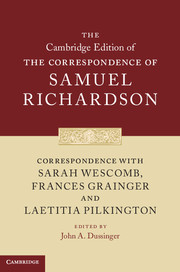Book contents
- Frontmatter
- Contents
- General Editors’ Preface
- Acknowledgements
- Chronology
- List of abbreviations
- General introduction
- RICHARDSON’S CORRESPONDENCE WITH SARAH WESCOMB
- RICHARDSON’S CORRESPONDENCE WITH FRANCES GRAINGER
- RICHARDSON’S CORRESPONDENCE WITH LAETITIA PILKINGTON
- Appendix Richardson’s list of worthy women In letter to Frances Grainger, 8 September 1750
- Index
- References
General introduction
Published online by Cambridge University Press: 05 November 2014
- Frontmatter
- Contents
- General Editors’ Preface
- Acknowledgements
- Chronology
- List of abbreviations
- General introduction
- RICHARDSON’S CORRESPONDENCE WITH SARAH WESCOMB
- RICHARDSON’S CORRESPONDENCE WITH FRANCES GRAINGER
- RICHARDSON’S CORRESPONDENCE WITH LAETITIA PILKINGTON
- Appendix Richardson’s list of worthy women In letter to Frances Grainger, 8 September 1750
- Index
- References
Summary
Richardson’s correspondence with Sarah (née Wescomb) Scudamore
Among all of Samuel Richardson’s female correspondents, Sarah Wescomb has been perhaps the least respected by modern scholars, even to the extent of their mistaking her proper name. Richardson’s biographers can scarcely disguise their contempt for her: ‘[Richardson] was evidently genuinely fond of the girl, and she as evidently deserved it, in spite of or because of her utter lack of intellectual pretensions, even to correct spelling. Their correspondence is almost barren of substance and is as repetitious and trivial as possible.’ But Eaves and Kimpel’s condescending dismissal of Sarah Wescomb is unfair primarily because some of Richardson’s most interesting letters were written to her. His very first message, for instance, eloquently defines the epistolary power to make the absent subject present; the ‘converse of the pen’ is even more aesthetically pure than ‘personal conversation’ – ‘more pure, yet more ardent, and less broken in upon’. Since Wescomb dared write to him only because he had requested it, Richardson understandably reassured her that her humble effort was not in vain: ‘Every line of it [her letter] flowing with that artless freedom, that noble consciousness of honourable meaning, which shine in every feature, in every sentiment, in every expression of the fair writer!’ Given the considerable emotional investment in writing more than thirty thousand words to her over a period of fourteen years, Richardson’s genuine admiration of Wescomb deserves a more sympathetic interpretation than Eaves and Kimpel have provided.
- Type
- Chapter
- Information
- Publisher: Cambridge University PressPrint publication year: 2014

